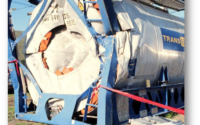Invest Wisely
Kevin Ryan
MAKE A WISE INVESTMENT
Leadership is one of the most discussed subjects in any field. It does not matter if it is business, military, or hazmat response. There are a bunch of articles, books, and podcasts out there on leadership. One thing that all this information cannot teach you is how to deal with people.
Dealing with people is a hard lesson for all leaders no matter how much experience you have. The one thing that all your training cannot specifically prepare you for is what do you do when members fail you? Make no doubt, your members will fail you at some point. Failure is a lesson in of itself. What does a leader do when this lesson is in progress? The answer is all about swallowing your pride. Take ownership of the failed endeavor. The leader needs to make themselves accountable in addition to taking ownership.

Take notice that I am using the word leader and not Chief, Capt. Lt. etc. A leader is not denoted by any rank or pins. Leaders are the ones who have earned respect of their members and will follow them anywhere. I am by no means advocating for disregarding the rank structure as it has a purpose in our profession. I am simply saying that when you stand in a group, people will always look at the natural leader that they trust and train with.
How does a leader get buy in when training and prepping a member for a dangerous job? What kind of motivation does a member need to get in a Level A plastic bag and enter a cloud of chlorine? The leader needs to invest in their members at every turn.
The definition of decision making is betting on the outcome of a choice. Leaders make choices all the time. Their decision making should be based on their most valuable resource. That resource as we all know is our members.
Technology has not taken the place of the most powerful asset we have in our arsenal. When given a choice, I will take a well-trained member with minimal equipment any day. Why? A member can do what technology cannot. A well-trained member can think outside the box, recognize clues and determine a course of action.

Critical thinking is the most important trait I look for in a member. Most hazmat teams are part of a larger Special Operations umbrella in larger departments. The members attracted to this type of work tend to be nonlinear thinkers. They do not think in straight lines but in zig zags connecting the dots. Nonlinear thinkers work best when trained with concepts rather than facts. Here is an example:
You are about to teach a group of students how to set a hot zone. Fact based teaching says a hot zone should be 75, 150 or 300 ft. based on the ERG. Teaching in this fashion does not give the member the ability to recognize certain conditions. Now let’s teach the concept of the most effective way to set up a hot zone. Using the ERG as a starting point, does the student understand how recognizing certain aspects of an incident can give them the opportunity to be flexible? Does the hot zone need to be larger based on the cloud of vapor that is coming from a tank truck? Can I shrink the initial hot zone setting based on meter readings? Investing in the students in this way promotes an asymmetrical thinking technician. Technicians that can recognize developing conditions, adjust tactics, and operate effectively are worth their weight in gold.
Members that feel empowered rather than micromanaged require more investment from a leader. The return on your investment for these members will more than justify the efforts to train them. In a sense, training is our capital to be spent wisely. Training that allows for self-development, critical thinking and teamwork will boost your portfolio more than any other tool at a leader’s disposal.
SOP’s, discipline, and policies only bring a minimal return. These promote a minimum standard but not an exceptional hazmatter. You can find the hazmatters that far exceed the minimum on every team. The one common trait with this group is how team oriented they are. The mission always comes first for them. There is no individual reward in their view. The team wins, they win. It is that simple.
One of the best things a leader can do is get out of the way when it’s time to suit up and enter the hot zone. Trust the time and effort that is put into building the team. I can say from my own experience that this is one of the more difficult things to accomplish. Effective leaders that have been there done that still get that urge to jump into action. A micromanager or a control freak in command shows a lack of trust and confidence developed through little to no training. The time until the entry team gives their first report can be nerve wracking. Seconds will seem like hours during this time. You will not know if the next transmission will be leak secured or a mayday. Trust the members you invested in to handle the situation presented to them.
Check the ego when you get the job of IC or Group Supervisor. Develop a solid plan with reasonable strategies and tactics. Invest wisely in your personnel. Respect their capabilities. Trust in the members you train. The team wins, you win #winning



